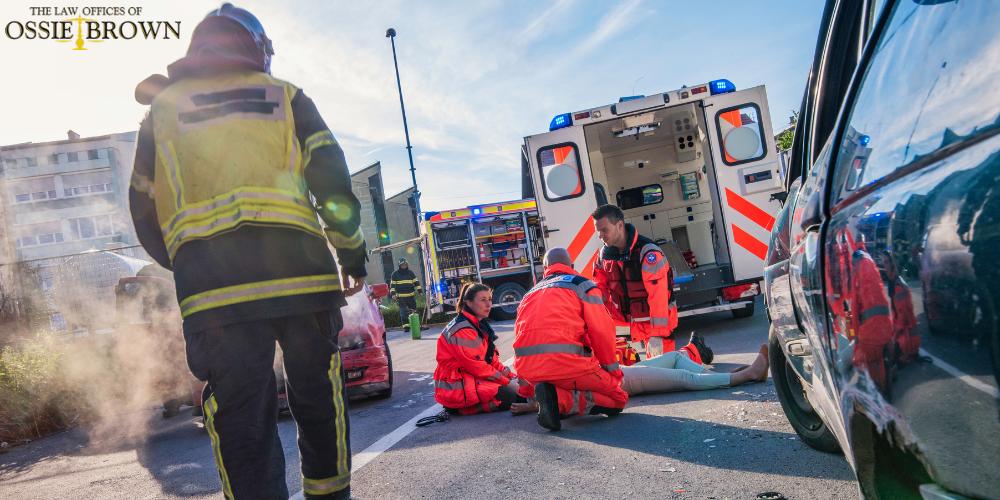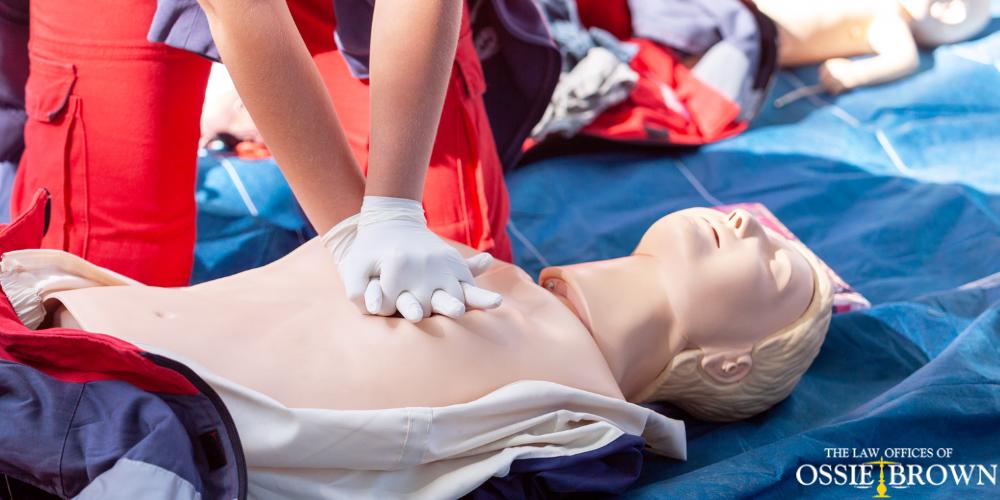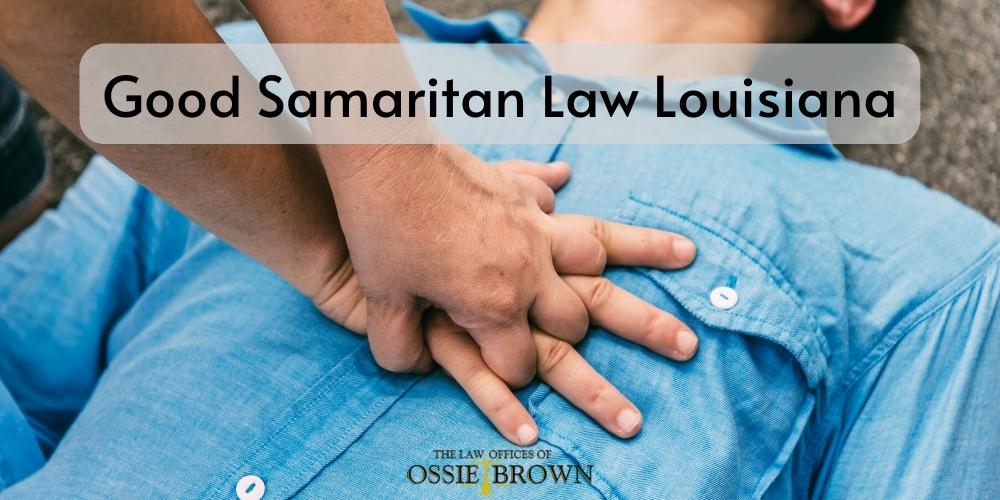In catastrophic accidents and emergency situations, the difference between life and death could be a matter of a few seconds. In many cases, doctors are not standing around as bystanders, waiting to jump in and save a life. That’s why it’s so important for the general public to offer emergency medical care, such as CPR, at least until emergency services arrive at the scene. But even if someone has taken a first aid and CPR training course before, they are still not medical professionals, so they still have the ability to accidentally hurt someone in the process of saving their life. This fact may deter a lot of people from stepping in and helping an injured person.
That’s why all 50 states have adopted variations of Good Samaritan Laws. This civil law is designed to not only protect individuals who render aid in good faith but also to encourage them to jump in and save a life because every second counts. In other words, Good Samaritan protection means that a victim cannot file a civil lawsuit if they suffer injuries as a result of a Good Samaritan saving their life. Below, our Baton Rouge personal injury lawyers break down the specifics of the Good Samaritan Law Louisiana, including who is protected, exceptions to the law, and so much more.
If you or a loved one has suffered catastrophic injuries or wrongful death as a result of gross negligence, you may have grounds to take legal action and recover damages. Call a Baton Rouge personal injury lawyer at 225-343-1111 today. The Law Offices of Ossie Brown offers free consultations to all new clients.
What is the Good Samaritan Law?
The Good Samaritan Law protects people who render aid during emergency situations where someone’s life is on the line without fear of legal repercussions.
For example, maybe someone gets into a car accident and stops breathing due to their injuries. Under Good Samaritan statutes, a bystander would be able to perform emergency medical care such as cardiopulmonary resuscitation (CPR) until emergency services arrive. If the car accident victim woke up and realized they suffered multiple broken ribs as a result of the CPR from the good Samaritan, they likely wouldn’t be able to sue for damages.
Good Samaritan laws vary by jurisdiction and levels of legal protection across the United States. However, many Good Samaritan laws state that good Samaritans are protected from criminal prosecution or civil liability as long as they didn’t commit gross negligence (AKA: reckless behavior) which led to further injuries. The person must be acting in good faith while providing emergency care.
Good Samaritan Law Louisiana
In Louisiana, there are two Good Samaritan laws, one protecting the general public (RS 9:2793) and one protecting medical professionals (RS 37:1731).
The first law states that a Good Samaritan who provides any form of emergency assistance, including transportation to a local hospital, shall be legally protected if their first aid (or lack thereof) unintentionally leads to further injury or damages.
The second law regarding medical professionals is much more complicated because this law was originally created to protect doctors from medical malpractice cases. This law basically states that medical professionals (such as emergency responders, physicians, surgeons, nurses, dentists, veterinarians, or physician assistants) have legal protection if they provide first aid to injured persons and their medical care (or lack thereof) causes further injury or damages. The only exception is if an on-call physician or other medical professional committed gross negligence which further injured the person.
Louisiana’s Good Samaritan law goes even further to protect emergency medical personnel who aren’t licensed to practice in the state (but do have a valid license in another state), as long as they provide medical care on the scene in good faith.
Examples of Good Samaritan Acts
Examples of medical emergencies that would be protected by the Good Samaritan Law Louisiana include:
- Pulling a car accident victim out of a crashed car and doing CPR until emergency medical personnel and/or police officers arrive at the scene. The victim suffers lacerations and a dislocated shoulder as a result of being pulled from the car.
- Rescuing a drowning person from a swimming pool and providing CPR until emergency responders arrive. The swimmer suffers a few broken ribs as a result of the CPR.
- Transporting a stabbing victim to the nearest hospital. The victim suffers severe blood loss during the transportation process.
- Breaking a car window in order to save a baby who is locked inside on a hot summer day. The baby suffers lacerations from the glass shattering.
In these situations, the victims would not be able to sue the good Samaritan who provided medical assistance even if they suffered further injuries during the rescuing process. As long as the rescuer had good intentions and wasn’t purposely acting recklessly or carelessly, they are legally protected.

Exceptions to the Good Samaritan Law in Louisiana
There are a few exceptions to the Good Samaritan Law in Louisiana. The law does not offer protection in the following situations:
- When the rescuer expects compensation for providing medical assistance.
- Someone purposely causes further harm to an injured person through recklessness, carelessness, or violence.
- The rescuer and victim are in an employer/employee relationship.
- The person who originally injured the victim offers medical assistance.
Failure to Seek Assistance Law vs. Good Samaritan Law
Most other countries have laws that state that all citizens have a duty to rescue or report during emergency situations where someone’s life is in imminent peril. Basically, if you don’t provide help or at least report that someone is gravely injured, you can face criminal charges and fines. Some people refer to this as the “bad Samaritan law.” A few U.S. states have some variation of duty to rescue laws as well.
Louisiana has a similar law called “failure to seek assistance” (RS 14:502). The law states that if someone sees a seriously injured person (or causes serious injury through reckless behavior), they must provide as much reasonable assistance as they can without endangering themselves in the process. Reasonable assistance means seeking help from bystanders or reporting the injury so that they may receive professional medical attention.
Failure to seek assistance in emergency situations can result in a $1,000 fine, a maximum jail sentence of 1 year with or without hard labor, or both.
If someone’s failure to seek emergency medical assistance results in a wrongful death, the person can face a $2,000 fine, a maximum jail sentence of 5 years with or without hard labor, or both.
Can I Sue if I Was Injured By a Good Samaritan?
You could only sue someone for providing emergency assistance if you can prove that they did so without good intentions and that you suffered further injuries/damages as a result of the emergency assistance. Or, you may sue if the person who originally caused your injuries was the one to offer assistance.
For example, let’s say you were severely injured in a drunk driving accident, and the drunk driver gets out of their car to render assistance until you receive professional medical attention. This drunk driver would not be protected under Good Samaritan laws in Louisiana. Yes, they did provide medical care after injuring you, but they’re technically required to do so under the “failure to seek assistance” law. You could still sue them for the civil damages you suffered as a result of the drunk driving accident, such as:
- All medical bills
- All physical therapy bills
- Lost wages
- Loss of earning capacity
- Physical pain and suffering
- Emotional distress
- Mental health counseling bills
- Permanent scarring, disfigurement, and/or disability
- Loss of consortium
- Loss of quality of life
- Funeral and burial expenses if the emergency assistance resulted in wrongful death
Be sure to speak with a Baton Rouge personal injury lawyer at the Law Offices of Ossie Brown if you believe that the “good Samaritan” in your situation should be held liable for damages. We can listen to your story, investigate the details of your situation, and help you determine if legal action is the best solution for you.
How to Protect Yourself When Providing Aid in an Emergency Situation
In most cases, Good Samaritan Laws in the U.S. protect nearly everyone in nearly every situation. Still, it’s not unheard of for traumatized victims to seek legal action following their accident.
The best way to protect yourself and an injured person during an emergency is to undergo CPR, AED, and first aid training. The American Red Cross offers countless training courses all over the state of Louisiana, so that you can literally save lives in the event of an emergency. Even if you do accidentally injure someone while saving their life, you can rest assured that you’ll be protected under U.S. Good Samaritan Laws.

Call Baton Rouge Personal Injury Lawyers at the Law Offices of Ossie Brown Today
If you or someone you love suffered catastrophic injuries or wrongful death as a result of gross negligence, you may have grounds to file a civil lawsuit in the state of Louisiana. We can help you determine if the negligent party could possibly be found liable for civil damages under the Good Samaritan act in Louisiana. Call Baton Rouge personal injury lawyers at 225-343-1111 to schedule a free consultation today.

